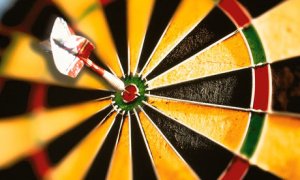” . . . and a donut without a hole, is a Danish.”
–Caddyshack
In a media dialogue between two minds I greatly admire, Scott Adams, the creator of Dilbert, and Associate’s Mind blogger and newly-published book author Keith Lee, the notion of setting goals recently took a severe beating.
Adams kicked off the goal-bashing in an entertaining Wall Street Journal piece, “What’s the best way to climb to the top? Be a failure.” Waxing autobiographically about the twists and turns that ultimately led to his huge success as a cartoonist, Adams suggests that goals, like diets, are basically a recipe for failure or disappointment, or both. He says:
“To put it bluntly, goals are for losers. That’s literally true most of the time. For example, if your goal is to lose 10 pounds, you will spend every moment until you reach the goal—if you reach it at all—feeling as if you were short of your goal. In other words, goal-oriented people exist in a state of nearly continuous failure that they hope will be temporary.
If you achieve your goal, you celebrate and feel terrific, but only until you realize that you just lost the thing that gave you purpose and direction. Your options are to feel empty and useless, perhaps enjoying the spoils of your success until they bore you, or to set new goals and re-enter the cycle of permanent presuccess failure.”
So, since “goals are for losers,” Adams suggests we settle into a comfortable couch and spark some high-resin Bob Hope, right? Sadly, no. Instead, he suggests the recipe for success is found in developing “systems.” Unlike goals, systems are not only durable but evolutionary. He writes:
“Throughout my career I’ve had my antennae up, looking for examples of people who use systems as opposed to goals. In most cases, as far as I can tell, the people who use systems do better. The systems-driven people have found a way to look at the familiar in new and more useful ways.”
For his part, in a post entitled “Goals Are For Losers,” Lee embraces Adams’ mantra hook, line and sinker. Because Lee tends to focus on our development as lawyers, he suggests that systems are the path to success as a lawyer. He says:
“This focus on systems – and systematic improvement – can apply to almost every aspect of being a lawyer. Want to improve your writing? Develop a system in which you consistently write and receive feedback. Want to improve oral argument skills? Get together with other lawyers and set up an informal meeting/group devoted to affording lawyer the opportunity to engage in oral arguments and receive feedback. Think mock trial team from law school. Hell get your firm or the local bar to sponsor/support it. You can’t just skate by and hope to succeed as a lawyer. You have to work at it.”
I’m here to say that I haven’t heard so much empty linguistic sophistry about “systems” from intelligent minds since I finished that awful Hegel seminar my last quarter at UC San Diego. Both Adams and Lee are spot on that systems are indeed the path to success. And Adams is absolutely right that all of us are going to encounter failure along that road. After all, failure and adversity are what teach us resilience and build our character.
Where both go wrong, however, is in the suggestion that we abandon goals. Whaaaa?
What is a system without a goal? It’s just an exercise. We wouldn’t “consistently write and receive feedback,” as Lee suggests, for the sake of writing and receiving feedback. We use this system to help reach the GOAL of becoming a better writer. If you were going to take time out of your otherwise busy life to “set up an informal meeting/group devoted to affording . . . the opportunity to engage in oral arguments and receive feedback,” you would do so in order to reach the GOAL of becoming a better oral advocate. (Brief aside: don’t bother “setting up” any such thing, just join Toastmasters.)
There are perpetual students who obtain multiple degrees and never really leave school. But they have a system–just no goal. Goals are the key to success, as the authors’ own success aptly–but perhaps unwillingly–illustrate. Keith Lee would never have become a lawyer without setting the GOALS of graduating from college, getting into law school, then completing law school. He wouldn’t have built a wildly successful and influential blawg without the GOAL of building a quality law blog. And, he would not have a new book worth reading if he had not set the GOAL of finishing a book worth reading.
The key here is not to abandon goal-setting. Rather, once you set a goal, develop a system to reach that goal. And be flexible about adjusting that goal if it begins to seem unrealistic or you suffer a major set back, which is reasonably likely.
On the other side of the coin, when you achieve a goal, don’t spiral into depression, feeling “empty and useless, perhaps enjoying the spoils of your success until they bore you.” Set a new goal! Reach higher and farther.
And read Dilbert. Often.





October 30th, 2013 at 10:35 am
[…] I went on to describe how I agreed and my focus on systems in my life. A couple days ago, Alex Craigie, made a post critical of my statements, entitled A System Without A Goal Is Not A Good System: […]
November 22nd, 2013 at 8:06 pm
I have visited your blog and I think that the Culture content could be of interest to our web site visitors. Great work and love to visit on your blog again and again. Keep posting nice information.
Resin Driveways Dorset
Resin Drive
Resin Drive Bournemouth
Resin Drive Poole